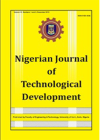
Nigerian Journal of Technological Development
A Quarterly Double-blind Peer-reviewed Journal
Publication Ethics
The Nigerian Journal of Technological Development (NJTD) observes ethical standards for its publications to ensure high quality, public trust in scientific findings, and that credits are given to the original owners of the ideas used by authors. To this end, members of public are requested to take note of the following information:
Data Fabrication and Falsification
NJTD takes exception to fabrication and falsification of data used in their works submitted to the journal. Published articles, which are later discovered to be guilty of this offence shall be retracted and such information publicised to our readership immediately.
Plagiarism Detection
NJTD uses an anti-plagiarism software to detect matches of the submission with the existing texts. Any submission with a similarity index greater than 25% will be rejected at that level.
Multiple Submissions
It is unethical for authors to submit a single manuscript to different journals concurrently. Authors who desire to submit an already submitted article with another journal must forward to NJTD Managing Editor evidence of withdrawal from the first journal.
Redundant Publications
This means publishing different versions of a very similar manuscript based on the same experiment or study. It can easily result in self-plagiarism, which should be avoided by authors.
Improper Author Contribution or Attribution
Authors are advised to ensure that all listed authors make a significant scientific contribution to the research in the manuscript before listing their names as co-authors. For transparency, authors should submit an author statements outlining individual contributions to the paper using the following roles: Conceptualization; Data curation; Formal analysis; Funding acquisition; Investigation; Methodology; Project administration; Resources; Software; Supervision; Validation; Visualization; Writing – original draft; Writing – review & editing.
For example, S. O. Sanni: Conceptualization, Methodology, Software, Validation, Writing – original draft, Writing – review & editing. M. F. Akorede: Supervision, Writing – original draft, Writing – review & editing. G. A. Olarinoye: Writing – review & editing.
COPE Policies
NJTD endorses the policies of Committee on Publication Ethics (COPE), including those that cover overlapping publications.
Confidentiality of Submissions
Reviewers are strongly advised against showing or discussing manuscripts allocated to them with colleagues and/or the authors. This is necessary to keep the submitted document as confidential as possible. This warning also applies to invited reviewers who decline the review invitation.
Reviewer’s Promptness
Any invited referee who does not possess the required expertise or has it but will be unavailable to carry out the assignment is requested to immediately notify the Managing Editor to decline the review invitation. This is necessary to avoid any unnecessary delay in the peer review process.
Notification of fundamental errors in published works
It is the obligation of the authors who discover significant errors or inaccuracies in their own published work to notify the Managing Editor promptly in order to take an appropriate action in due course.
Access to Journal Contents
The publisher, Faculty of Engineering & Technology, University of Ilorin, is committed to ensuring that published scholarly research findings are permanently made available online as well as in print form. This would guarantee express access to them at any time.
Open Access Policy
All research articles published in the Nigerian Journal of Technological Development are fully open access. They are immediately freely available to read, download and share. Articles are published under the terms of a Creative Commons license which permits use, distribution and reproduction in any medium, provided the original work is properly cited.
Copyright & Licensing
The Nigerian Journal of Technological Development (NJTD) allows authors to retain the copyright of their papers, without restrictions. The authors can then grant the publisher exclusive publishing rights to publish the articles.
Privacy Statement
The names and email addresses entered in this journal site will be used exclusively for the stated purposes of this journal and will not be made available for any other purpose or to any other party.
Peer Review Process
NJTD operates a double anonymised peer review process. All submissions will be initially assessed by the Editor for suitability for the journal. Papers deemed technically suitable are then subjected to plagiarism check. If the similarity index is higher than 25%, such article is rejected at that stage and the corresponding author is communicated. Articles that pass this stage will be allocated to a Section Editor, who assigns a minimum of three reviewers to evaluate the scientific quality of the manuscript. However, the Editor is responsible for the final decision regarding acceptance or rejection of articles, and this decision is final.
Authors are encouraged to download the article processing flowchart from our homepage. The document summarises the peer review process used by NJTD. Authors should note that this process may last up to three months on the average. We therefore encourage authors to write to request for updates on the status of their submission(s) only when the said period has elapsed.
Abstracting and Indexing
The Nigerian Journal of Technological Development (NJTD) is indexed and abstracted by the following:
- SCOPUS (2019-2022)
- CiteScore 2021 = 0.2; SNIP 2021 = 0.108; SJR 2021 = 0.117
- SCImago Journal Rank (2019-2022)
- DOAJ
- Crossref
- AJOL
- Google Scholar
- Researchgate
- Genamics JournalSeek
- WorldCat Discovery Services


